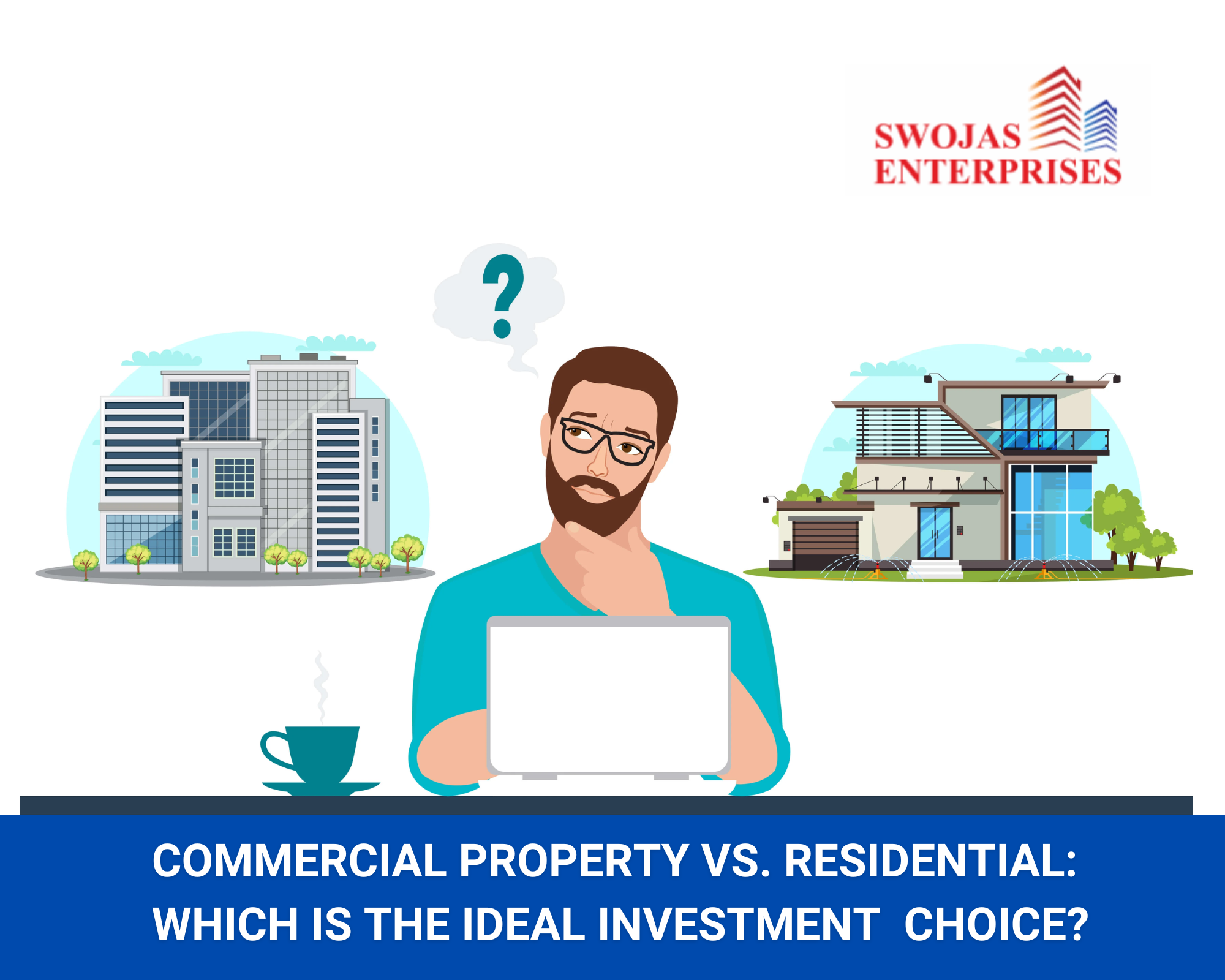Commercial Property vs. Residential: Which is the Ideal Investment Choice?
Admin20222024-09-28T06:00:38+00:00One of the most important decisions you’ll need to make when investing in real estate is whether to buy commercial or residential property. Both sorts of investments provide distinct benefits while also posing unique problems. Understanding the distinctions between commercial and residential property investment will help you make an informed decision that is consistent with your financial objectives and risk tolerance. This blog will go into the essential characteristics of each investment type, providing insights into their potential benefits and drawbacks to help you choose the best investment for your situation.
Understanding Commercial Property Investments
Commercial properties include a variety of real estate categories such as office buildings, retail stores, and warehouses. These properties are often rented to businesses rather than individuals, which can provide numerous benefits.
1. Higher Returns and Longer Lease Periods: One of the primary benefits of commercial property is the possibility for larger profits. Commercial leases are frequently longer than residential leases, ensuring consistent cash flow and stability for property owners. Businesses typically sign leases for three to 10 years, which can lessen the frequency of tenant change and vacant periods.
2. Steady Cash Flow: Commercial properties may provide more predictable revenue flow due to longer lease agreements and higher rental prices. This consistent income might be beneficial for people trying to establish a dependable money source.
However, commercial properties come with their own set of challenges:
1. Higher Initial Costs: Investing in commercial real estate often demands a greater initial investment than residential properties. This greater entry cost may be a deterrent for many investors.
2. Market Fluctuations and Management: Commercial assets are more vulnerable to market swings, and their administration can be more challenging. Professional property management may be required to handle the details of commercial leases and maintenance.
Understanding Residential Property Investments
Residential properties, which include apartments, single-family homes, and condominiums, offer a different set of benefits and challenges.
1. Lower Entry Costs: Residential properties typically demand a lower initial investment than commercial properties. This makes them more accessible to first-time investors and those on a tight budget.
2. Emotional Value and High Demand: Residential properties frequently have emotional appeal and strong demand. People constantly need a place to live, thus residential properties can provide consistent demand and possibly faster sales or rental prospects.
However, there are some drawbacks to consider:
1. Maintenance Responsibilities: Residential properties necessitate regular care and administration, which can be time-consuming. Landlords must handle repair issues and maintain tenant relationships, which can be difficult.
2. Tenant Turnover and Market Sensitivity: Residential properties may have a higher tenant turnover and are more susceptible to market swings. Vacancies and rental income unpredictability can have an impact on overall profits.
Comparative Analysis: Commercial vs. Residential
1. ROI (Return on Investment): Commercial buildings can provide larger returns than residential ones. Longer leases and higher rents have the potential to increase profits significantly. Residential properties, on the other hand, may deliver more predictable profits due to constant demand and reduced overall risks.
2. Risk Factors: Commercial properties carry higher risks due to market changes and economic situations influencing enterprises. Residential properties, on the other hand, involve risks such as tenant turnover and upkeep expenditures, but they often provide more stability.
3. Market Trends: The current market trends in Pune and other places reveal varying demand for commercial and residential properties. Residential markets may see swings due to population expansion and housing availability, whilst commercial markets may be influenced by economic conditions and business trends.
Factors to Consider When Choosing Between Commercial and Residential
1. Investment Goals: When picking between commercial and residential properties, consider both your long-term and short-term financial goals. Commercial investments may be better suited for long-term gains and consistent cash flow, whilst residential investments may be more suitable for short-term aims and increased liquidity.
2. Financial Capacity: Evaluate your budget and financial freedom. Commercial properties typically demand a larger investment and higher operating costs, but residential properties may have a lower barrier to entry.
3. Risk Tolerance: Consider the level of risk you are willing to take. Commercial assets can yield larger returns but carry more risk, whilst residential properties may provide more stability but perhaps lower yields.
4. Market Knowledge: Understanding the unique market conditions for each property type is critical. Make an informed selection by researching market trends and property values.
Case Studies or Examples
1. Commercial Investment Success: A retail facility in a high-traffic region that won a long-term lease with a well-known brand is an excellent example of successful commercial investment. This property generated consistent rental revenue and significant returns due to its prime location and strong commercial presence.
2. Residential Investment Success: On the residential side, an investor who purchased numerous rental homes in an emerging neighbourhood saw tremendous gain and rental income as the neighbourhood grew and demand climbed.
Take The Call With Swojas Realty
Deciding between commercial vs. residential property investment depends on your individual goals, financial situation, and risk tolerance. Both types of investments offer unique advantages and come with their own challenges. By carefully evaluating your investment objectives and considering factors like ROI, risk, and market trends, you can make a well-informed decision that aligns with your financial strategy.
Ready to explore your investment options? Whether you’re interested in commercial or residential properties, Swojas Realty can help you find the perfect investment that meets your needs. Visit our website to explore current listings and contact our team for personalized advice and assistance in making the ideal investment choice.











